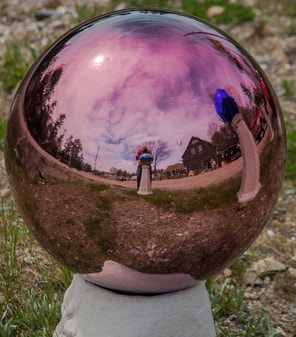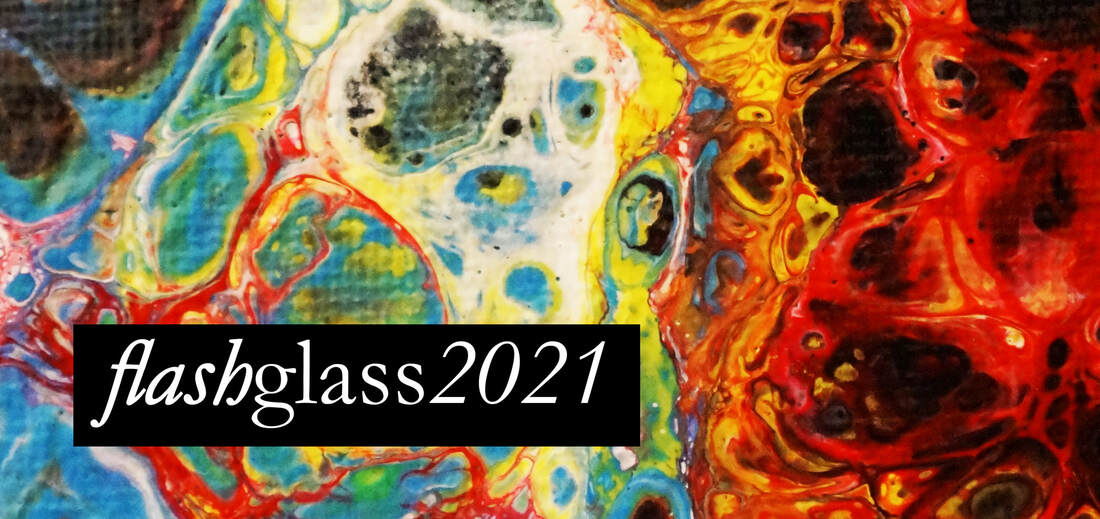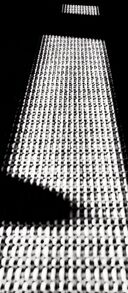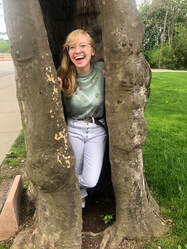|
We are pleased to present our annual flashglass anthology! Comprised of all flash works originally published online at rowanglassworks.org in 2021, this anthology is available for online viewing and for purchase in print.

By Glassworks Magazine in flashglass 32 pages, published 1/1/2022
an anthology of work originally published at rowanglassworks.org
0 Comments
 I only wanted to hold Birthday Bear and sit quietly while the adults talked, but Aunty Maureen had asked me to show her my new toy. She took the Care Bear from my outstretched hands. “Be careful,” I said “he’s new.” But she didn’t hear me. “Birthday Bear,” she sang, bouncing and jigging him around up close to her face like a baby. “Birthday Bear! Birthday Bear!” "Be careful,” I said again, but quieter this time. More to myself: something was telling me not to let on that I cared. Aunty Maureen lifted Birthday Bear up, holding him firmly around his torso; her red painted finger nails pinching his stomach. I grabbed the air, trying to reach for him back. Then up towards the ceiling he suddenly flew. Twisting and curling skyward through the air, spinning back down into her hands again like a trapeze artist or tumbling gymnast. My eyes stayed glued to the soaring yellow sun-ball. He flew high above our heads. And every time he landed, the knot in my stomach tightened and tightened. Aunty Maureen caught Birthday Bear with one final big swoop and a dip, but instead of passing him back to me, she took ahold of the single piggy-tail curl—his hair—on the top of his head—and started spinning. Around and around. “Oh look,” she laughed. “Birthday Bear’s having fun!” I wanted to laugh like the other adults in the room. Think the same things were funny. But couldn’t. Birthday Bear was suffering. Every time his face came around to the front, our eyes locked and I knew his smiling happy bear-face was calling Help! Birthday Bear hung precariously in the air. Faster and faster, she spun. I wanted to shout, Stop! Don’t do that. You’ll hurt him. But I feared Aunty Maureen's reply would be: “Oh Becky. You don’t think I’m hurting him—do you? He’s not alive you know!” But he was alive. He was feeling everything. The same way I was feeling powerless to stop everything. The cruel joke. “Oh Mum,” Mercedes said walking into the room carrying a tray of sandwiches. “For heaven’s sake—what on earth have you got there?” Mercedes—Aunty Maureen’s daughter—was my favorite cousin. Even though she was older than me by fifteen years, and an adult, we were still friends. “It’s a Care Bear,” Aunty Maureen jeered. “Well, it’s not yours is it Mum?” Mercedes said winking at me. "Give it back to the birthday girl will you and stop teasing?” Aunty Maureen lowered Birthday Bear. “Oh goodness,” she mocked. “Don’t be silly. We were only having a bit of fun weren’t we Bec?” But I didn’t reply. I lifted Birthday Bear from her lap and pulled him in close to me. Everything’s okay now, I whispered under my breath, stroking his head. And then later that evening, as I fell asleep, I vowed never to him out of my sight again. Care Bears have real feelings you know. Just like people. Becky Jeeves was born and raised in England and now resides in Massachusetts. Her writing has appeared in HerStry and The Write Launch and is forthcoming in Months to Years and Happiful Magazine. When she is not writing she is busy curating artwork, vintage collectables and Asian porcelain for her antiques booth. Find her on Instagram: @becky_jeeves
~ Drinking a toast to his bride in a reception hall when my mother appeared in the doorway, stomach round as a beach ball ~ Decorating a Christmas tree when the TV cut to a breaking story on the local news about a baby left in a bicycle basket outside the fire station, which reminded him of an ultimatum he got last spring, and so he does the math ~ Pushing his six-year-old twins on swings while scrolling through an email from a cousin asking didn’t he date a Sarah-What’s-Her-Name at Cane Ridge High? Well, the reason she left for Iowa early senior year… ~ Arguing with his eldest sister in a law office over their parents’ estate which included a bequest to some grandchild he’d never heard of ~ Fanning himself with a program while seated in midday heat at his grandson’s college commencement when a semi-familiar woman sidles up and introduces herself, points me out across the lawn  Shoshauna Shy resides in Madison, Wisconsin, a freelance copy editor and flash fiction author and poet whose stories have recently appeared in the public arena courtesy of Five on the Fifth, BigCityLit, 50 Give or Take, Brilliant Flash Fiction and Ariel Chart. One of her flash was included in the Best Microfiction 2021 series by Pelekinesis Press, and she was also one of the seven finalists for the 2021 Fish Flash Fiction Prize out of County Cork, Ireland. Learn more at: https://PoetryJumpsOfftheShelf.com 1. Run your fingers along the wheat field of your eyebrows to make sure the hairs are not crisscrossing but facing the direction of their growth. 2. Rub your stomach after a filling meal, testing its changed shape. When you cut off one head of body insecurity —counting calories, keeping clothes that won’t fit, buying clothes you hope will – it grows another. 3. Don’t drink coffee. You’ll turn into an angry wind-up toy. 4. Don’t drink cold brew. It’ll make you extroverted in the day but at night you’ll wake up crying from dreams about severed heads. 5. Drinking tea is acceptable. 6. Crack your finger joints like a light stick that releases opioid instead of light. Crack your toes next, then your knees. Your mom and grandma tell you you’ll lose a prospective husband over this. You’re willing to risk it. 7. Accept that your nails will tear off like perforated packaging unless you strengthen them by eating tilapia a few times a week. 8. Cut your split ends. Lose yourself in it for half an hour and then remember you were trying to finish a book. 9. Take your body to Barnes & Noble. Feel it tingle and hum. 10. Take your body to the movies. Go alone. Cry freely. Cry often. 11. Take your body on a Tinder date. Be amazed he looks nicer in person. His lashes are like the moon; the camera can’t capture them. You have to wear mascara. 12. Shed a tear when a lash comes off on your makeup remover wipe. 13. Move your body up three steps to get on a stage. The only time you can restrain yourself from cracking joints is when you crack jokes. This means five minutes of perfect, un-joint-cracking you, so scan the Wednesday-night crowd at this oyster bar with care to secure a husband. 14. Smile when the crowd erupts like the inside of a car when you open a window going 80 on the interstate.  Katrina Papouskaya is a Russian-American writer currently residing in New Jersey. She is working on her MFA in poetry at The New School in New York City. You can find her at www.katrinapapouskaya.com.  When she was little, she used the gazing ball like a funhouse mirror, watching her cheeks stretch as she danced around in circles, chanting incantations of made-up words. In college, it had only poked fun at her body dysmorphia, asking, Just how wide can we make those thighs? Now, she wonders what it would feel like to take it off its plaster pedestal and kick it down the street, what sound it would make when it broke. She splays her fingers and follows the curvature with her fingertips. The glass is cold from the March air, almost wet to the touch. What would they think if she cracked it like an egg? If she picked it up and hurled it against the window? The nieces and nephews she barely recognizes anymore, the aunts and uncles, all huddled around her mother like she’s some kind of grieving campfire—would it shock them out of pretending like they understand what was lost? She wipes her fingers on her pantleg. Stepping back, she watches as the early rosebuds take on their new shape in the curved glass, how the red and yellow petals transform under the suggestion of purple tint. In a few months, the yard will be empty of rose bushes. Without her father to tend them, they will become the charge of the church, orphans replanted in a prayer garden. Closing her eyes, she grips the gazing ball in both hands and holds it over her head. She breathes in the smell of lingering dew on year-old mulch and looks up to see her own funhouse face staring back at her. Then, she lets it drop and it shatters on the concrete. ~ When her wife dies thirty years later, she tells the funeral director she doesn’t want to see a single rose at the service. She buys wilting bouquets of ranunculus from the grocery store and places them in empty gold-painted wine bottles. They look foolish, their heads turned every which way like they’ve never lost anything in their lives.
After the service ends, she stands at the back of the reception hall with a crumpled paper cup gripped in her hand. Coffee roils in her otherwise empty stomach and she walks to the bathroom to throw up. Washing and drying her hands, she spots a soft touch of pink in the trashcan and finds a cluster of cut roses buried beneath a wad of paper towel. A gift from an unsuspecting guest, she supposes, someone from her wife’s side of the family. She wonders who tipped them off, the funeral director or her brother. She pushes aside the paper towels and pulls the bouquet from the trash, shaking loose the wispy backing of a menstrual pad clinging to a bruised petal. That night, she falls asleep with both lamps and the overhead light on, the bouquet of roses tucked beneath the comforter on her wife’s side of the bed. Their fragile blooms rest against the pillowcase she can’t bring herself to wash. In the morning, she awakens to find the roses battered and broken beneath the arm she must have extended in search of her wife’s sleeping form. She scoops the stems into her fist and carries them with her as she walks down the hallway and into the kitchen. She fills a vase with water for her defeated bouquet and pours herself a cup of day-old coffee. She pulls on a housecoat and steps into her slippers before carrying the vase out to the front walkway. The neighbor across the street looks up from their lawnmower and waves. She waves back and lifts the vase over her head before letting it drop. The neighbor stares as she walks back into her empty home, leaving behind a mess of shattered glass and dying roses. A boy, perhaps eight or nine, shifted under the weight of a sleeping baby on his back in a makeshift sling. Hands and face smudged with dust and dirt, he begged for money with vacant eyes and an outstretched hand, and he moved on when my friend said he had nothing to give. “They do that to get sympathy, and more money,” my friend said as we walked further, “and if you give money to one, the rest see it and swarm you.” My heart burst into a smile as I headed to the border town alone on a quiet, gray morning. “Maybe they’re not up this early,” I thought. I walked carefully to find anyone, everyone. In the distance, I saw him. Yes, he had the baby on his back. I rushed to him. He held out his hand, and I wondered if he recognized me from the day before. His monotonous motions told me no. He looked up at me with those same dusty eyes. I slung off my backpack and dove in for the goods. I handed him a package of raisin bread and beamed as I dug for milk. He looked away then at me again. “No food. Money,” he said in English. “No, I don’t have money, but you need to eat something. Here’s some milk for your sister.” I held the provisions out again. “Money,” he said. Drained by the experience, he shuffled away, and some other brazen children plucked the snacks from my hand and ran off giggling. I stared at the boy and the baby until they drifted out of sight. Karen Toralba is an American living in Bangkok, Thailand. She has worked in English education for 20 years, most of which have been overseas. This almost exotic lifestyle opens many doors to unique experiences which can transform into stories. She is embarking on her publishing journey with accepted pieces in The Dead Mule School of Southern Literature, Fiction on the Web, The Fictional Café and Buddy lit zine.
 The rain came down in sheets, the grey dampening a once crisp sky and dulling the buzz I had spent too much time and money cultivating. To say I was disappointed was to not understand how much I needed to stop the chaos or at least slow it down, how much I ached to escape your mother’s shame when she found us entwined and unabashed in the rooftop garden. It wasn’t the softness of my skin or the flatter bulge of my vulva that shocked her; she had always suspected your taste ran sapphic, it was my social standing and disregard for yours, or really hers as she saw what your neighbors most certainly did from their windows. You paused only a moment before running to soothe her seethe, while I stayed outside, slowly picking up lust-tossed clothes, folding yours, meticulously adjusting my shirt and pants and hair. I would not let her humiliate me, despite in many ways, having humiliated her. I see that now, and I know it is petty. Forgive me. I was not brought up in shame or guilt. I did not understand how you must have felt. I did not know that this, my inability to respond quickly, was would be what would break us apart. When you brought your sweets to the roof, offered me a plate of colored desserts, I had wanted just one bite of the yellow, unaware I should have savored them all.  Heather Bourbeau’s work has appeared in 100 Word Story, Alaska Quarterly Review, The MacGuffin, Meridian, The Stockholm Review of Literature, and SWWIM. She is the winner of La Piccioletta Barca’s inaugural competition and the Chapman Magazine Flash Fiction winner, and has twice been nominated for a Pushcart Prize. She has worked with various UN agencies, including the UN peacekeeping mission in Liberia and UNICEF Somalia.  I had seven dreams about my grandmother dying. Cancer was the first; hairless, wrinkled, reaching out a hand to my father, her only son. Next came the car accident. She was always a reckless driver, I remember holding onto the door handle as she sped through lights and hollered at jaywalkers. They just kept coming, night after night: house fire, hit by a bus, choked on her favorite steak dinner. Tripped at the grocery store. Went to bed after a Dateline special and simply never woke up. I didn’t know who to tell. I didn’t know if I was even supposed to say anything. I was a kid who snuck downstairs after bed to watch CSI from behind the couch, I had bad dreams all the time. Nights where I showed up to school naked, or accidentally locked Remy, our German Shepherd, in the basement. Even a hauntingly specific one of being attacked by those talking rats from some Disney cartoon. These dreams didn’t feel too different at the time. The morning after the last one, my dad got a call at the breakfast table. It was brief, he said a few words, then went and locked himself in his office on the third floor. Not even my mom was allowed in. The funeral was two weeks later, a rainy Sunday spent wondering why I alone had been warned about this. I never had another dream like that. Never even had a single nightmare after that week, as luck would have it. If I dreamt at all it was fairly tame - visiting Disney World, lost in IKEA, an especially memorable one where I married my favorite Starbucks barista. Three decades of good dreams nearly put that week from my mind, erasing whatever precognitive abilities I’d dared to assume I had. My sister called this past Friday morning. She usually phones on Sunday so we can straighten out dad’s care schedule for the week, figure out who’s going to take him to the hospital when. It’s usually all very straight forward. Kara doesn’t beat around the bush; too many kids to wrangle, too little of her youth left. “You know,” she started, taking a slurping drink of coffee, drowning out the background noise of the kids playing. “Elsie told me she had a dream about you.” Meredith Sullivan is an actress and writer from Baltimore, currently living in Philadelphia. She graduated from the University of Pittsburgh with a B.A in fiction writing in 2017, and is still trying to put that to use somehow. Recently, she has been published in fresh.ink and Prometheus Dreaming.
 So what now with the house gone? We weren’t allowed, a fireman said, to sift through the remains until we discussed it with our house insurance. Nails could cause injuries and the bare skeleton walls that survived could collapse at any moment. Windburned and dried eyes, we watched them hose the last of the embers. A police officer asked for our information and said the Red Cross would come by. Offered condolences. A stranger approached us, passed out a pamphlet for his contractor’s company, then offered condolences. Neighbors came by foot and car, wide-eyed, at the tidy disaster. When the fire was 100% contained and evacuation orders lifted, only three houses were destroyed. Ninety-three acres blackened and reminded us of the other time our same block—because most of it was just yellow dry grass—burned without consuming any homes. That time, our house was lucky; the coops were untouched, peach trees bountiful, even the bees under the front porch eave whirled around paying no attention. What were we supposed to do? Don old face masks found in the van and roamed the clothing section of Wal-Mart an hour before the store closed. Bought underwear, shirts, pants, toothbrushes, and towels with the Red Cross’s cards, totaling in the high hundreds for the nine of us. Drove to my married sister’s house across town and slept on couches and mattress toppers. My younger brother cried and so did two of my sisters. What did we forget? Grandmother’s traditional clothes, sewn by her mother in Laos. Grandfather’s last words to my father, recorded on an old Samsung phone. VHS home videos of my sisters karaoking and lip syncing to classic tunes. Brothers’ baby pictures, professionally taken with the moon and American flag as backdrops. My parents’ photos from the early 90s and 2000s--taken next to our neighbor’s floral garden, wearing puffy dresses and black suits as well as our traditional outfits—kept in large albums. Their documents from the refugee camp. Even the clothes mother sewed. The personal inventory list took weeks to complete. We didn’t know how to calculate all that loss. Why did this happen? We checked CAL-FIRE daily but the cause was never updated. Insurance put us in a hotel for two weeks while we searched for a rental house but northern California lacked homes, especially after the Camp Fire. We still had doctor’s appointments. We checked the mailbox. We visited relatives despite COVID because grandmother craved jasmine rice and greens and I wanted anything but the constant fast food that cemented my stomach. We went back to the site and poked through wreckage but it was the sight of the chicken carcasses in the backyard that prompted my older sister to weep, insisting that their souls must be furious. What did I remember? Dreading smoke clouds. Screaming for my older sister to flee the garden. Heaving grandmother’s suitcase into the van. Demanding everyone to get in the car. Seeing the house in the rearview mirror and believing the ancestors would protect it. Crying while driving because there was no home to return to. The bees and how, two days before the fire, my father sprayed them with water and destroyed their nests after all these years of tentative co-existence.
 The first thing out of the doctor’s mouth was “how is your summer going?” and I felt like slapping her but I stayed in my chair, recalling ultrasounds with heartbeats and ultrasounds without, hexagonal pills and searing pain and a bag labelled “biohazard,” and I remembered the mockery of the sun on my face as I carried the bag on the bus in my purse and delivered it to the hospital where a nurse removed the container from inside the bag, held it up to the light and chirped, “You got the right thing!” and took it away to be tested since this was number four and four wasn’t normal, especially when you’re 29, and she called me a month later to tell me it was a “genetically normal baby girl” and had no other words since the usual comforts didn’t apply, and it occurred to me that I had no other memories of the summer except for the cloud that became the world so that even in the mirror there was only fog, and then the doctor said, “We can’t find the cause and there’s nothing else we can do, except maybe IVF but I doubt it would work,” and she went to fetch some papers while the med student beside her whom I’d barely noticed before, squeezed her hands excitedly and took the opportunity to say, “I find this all so fascinating!” and I found it all so strange that as a light goes out in one person, it ignites in another, and it seemed I had contributed to the circle of life. Andrea Lynn Koohi is a writer and editor from Toronto, Canada. Her work appears or is forthcoming in The Maine Review, Pithead Chapel, Idle Ink, Streetlight Magazine, Emerge Literary Journal and others.
|
FLASH GLASS: A MONTHLY PUBLICATION OF FLASH FICTION, PROSE POETRY, & MICRO ESSAYSCategories
All
COVER IMAGE:
|
|
Glassworks is a publication of Rowan University's Master of Arts in Writing 260 Victoria Street • Glassboro, New Jersey 08028 [email protected] |
All Content on this Site (c) 2024 Glassworks
|







 RSS Feed
RSS Feed
